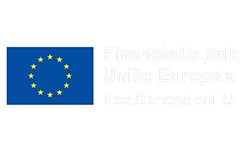

Our focus on this project was the development of training offers within the framework of the European Policy for Microcredentials, in line with the European Council’s recommendation on the approach to Microcredentials and Lifelong Learning, adopted on June 16, 2022.
Our focus on this project was the development of training offers within the framework of the European Policy for Microcredentials, in line with the European Council’s recommendation on the approach to Microcredentials and Lifelong Learning, adopted on June 16, 2022.
Our focus on this project was the development of training offers within the framework of the European Policy for Microcredentials, in line with the European Council’s recommendation on the approach to Microcredentials and Lifelong Learning, adopted on June 16, 2022.
Microcredentials thus emerge as a reference approach to guarantee the acquisition of skills and personal and professional development of Europeans, as they attest to the learning results obtained through a short course or module that is assessed in a transparent manner.
Microcredentials can be obtained through courses taught in person, online or hybrid. This feature makes Microcredentials a very flexible and inclusive form of learning, enabling the targeted acquisition of skills and competencies.
Under this project, and with a duration of 4 years, the Autónoma Academy will present various proposals that can provide all those who seek them with technical-professional Microcredential qualifications.
STEAM Youth Boost
The purpose of Impulso Jovens STEAM is to promote and support initiatives aimed exclusively at increasing the higher education of young people in the areas of science, technology, engineering, arts and mathematics (STEAM), through the provision of undergraduate degrees and other initial higher education courses, in a higher education study cycle or in a postgraduate/micro-credentials, or higher professional technical course listed in Annex I or II to this addendum and which form an integral part thereof, for a minimum of 30 ects.
Adult Impulse
The purpose of Impulso Adultos is to support the conversion and updating of skills of active adults, through short-term training in higher education, at initial and postgraduate level, in all areas of knowledge, as well as lifelong training, in a higher education study cycle or in a postgraduate/micro-credentials, or higher professional technical course listed in Annex I or II to this addendum and which form an integral part thereof, for a minimum of 30 ects.
Scholarships
We provide scholarships to students enrolled in these courses at Autónoma Academy, in accordance with the approved Scholarship Regulations, and whose enrollment is active on October 31st of the year in which the scholarship is awarded.
FAQ'S
According to the European Commission website, a credential is “a qualification that attests to the learning outcomes achieved through a short, transparently assessed course or module.”
Courses leading to this type of qualification are designed to provide students with specific knowledge, skills and competencies that respond to work, cultural, personal or societal needs.
A student’s microcredentials are shareable and portable – they can stand alone or be combined with larger credentials. Most importantly, they are backed by quality assurance, following agreed industry or field standards.
Micro-credentials are provided by higher education and vocational training (VET) institutions as well as private bodies.
Microcredentials are available to anyone who wants to consolidate knowledge already acquired, without completing a full higher education program, and for those who want to improve their existing skills – or even retrain to meet the needs of the job market – and can even develop professionally after they have started working.
Microcredentials are available to anyone who wants to consolidate knowledge already acquired, without completing a full higher education program, and for those who want to improve their existing skills – or even retrain to meet the needs of the job market – and can even develop professionally after they have started working.
Transparency is the basis for microcredentials to be reliable. They must be clearly identified and must contain elements that make their value and content clear, both for students and for education and training institutions. The list of critical information that microcredentials must contain is as follows:
– Student identification;
– Microcredential title;
– Country/Region of the issuer;
– Contracting authority;
– Date of issue;
– Learning outcomes;
– Workload required to achieve learning outcomes (ECTS, where possible);
– Level (and Cycle, if applicable) of the learning experience that led to the micro-credential (EQF, QF-EHEA), if applicable;
– Type of Assessment;
– Form of participation in the learning activity;
Type of quality assurance used to support micro-credentialing.
In addition to this list, there is another optional list, when relevant:
– Prerequisites needed to enroll in the learning activity;
– Supervision and identity verification during assessment (unsupervised and without identity verification, supervised without identity verification, supervised online or on-site with identity verification);
– Grade achieved;
– Integration/stackability options (standalone, standalone/integrated microcredential,
stackable to another credential);
– Other information
The European approach to micro-credentials encompasses a process based on 10 principles:
Quality
Microcredentials are subject to internal and external quality assurance by the system that produces them. Quality assurance processes must be fit for purpose, clearly documented, accessible, and responsive to the needs of learners and stakeholders.
External quality assurance relies primarily on the evaluation of suppliers (rather than individual courses) and the effectiveness of their internal quality assurance procedures.
Transparency
Micro-credentials are measurable, comparable and understandable with clear information on learning outcomes, workload, content, level and learning delivery as relevant.
Relevance
Microcredentials should be designed as distinct, targeted learning achievements, and the opportunities leading to them are updated as needed to meet identified learning needs.
Valid Assessment
Microcredential learning outcomes are assessed against transparent standards
Learning Paths
Microcredentials are designed to support flexible learning pathways, including the ability to stack, validate, and recognize microcredentials from different systems.
Recognition
Recognition has a clear signalling value of learning outcomes and paves the way for a wider offer of these small learning experiences in a comparable way across the EU.
Micro-credentials are recognised for academic or employment purposes based on standard recognition procedures used in the recognition of foreign qualifications and periods of learning abroad, when dealing with micro-credentials issued by formal education providers.
Portability
Microcredentials are owned by the credential holder (the learner) and can be stored and shared easily by the credential holder, including via secure digital wallets (e.g. Europass), in line with the General Data Protection Regulation. The infrastructure for data storage is based on standards and data models, this ensures interoperability and seamless data exchange, and enables smooth data authenticity checks.
Student Centered
Microcredentials are designed to meet the needs of the target group of students. Students are involved in internal and external quality assurance processes and their feedback is taken into account as part of the continuous improvement of the microcredential.
Authentic
Microcredentials contain sufficient information to verify the identity of the credential holder (student), the legal identity of the issuer, and the date and place of issuance of the microcredential.
Information and Guidance
Information and advice on microcredentials should be incorporated into lifelong learning guidance services and should reach the broadest possible groups of learners in an inclusive way, supporting education, training and career choices.
For detailed information on the microcredentials process, we recommend reading the European Commission website. Sources: https://education.ec.europa.eu/en/education-levels/higher-education/micro-credentials




